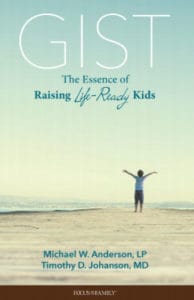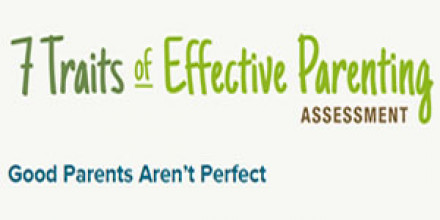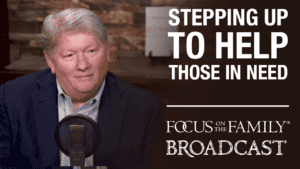Jim Daly: You have a kind of bucket list for children, which, uh, are the difficult experiences you think they need to have in order to be ready for life. Now, I got to tell you, as a parent, I’m thinking, “I’ve got to keep them from difficult experiences,” but what’s on that list?
Michael Anderson: Yeah, a lot of the things we instinctively try to keep our kids from are things they need to be ready for adulthood, ’cause adulthood isn’t going to be easy. Some of those things would be like not being invited to a birthday party, and we don’t need to jump in and try to get them invited or call the mom, those are experiences we need.
Jim: (laughing)
Michael: The death of a pet, or working hard on a paper and getting a poor grade, or, um, being fired from a job.
Jim: Mmm.
Michael: Um, it’s not always a bad thing for a young kid to be fired from a job, especially if they need to learn more responsibility.
Jim: Mm-hmm.
Michael: It might be the only thing that’ll get them to take it seriously.
John Fuller: That’s Michael Anderson, and he was our guest last time on Focus on the Family. Michael is a licensed psychologist, and he was joined by Dr. Timothy Johanson, a pediatrician. And together, these gentlemen have written a terrific book. It’s called Gist: The Essence of Raising Life-Ready Kids, and we’re going hear a lot about that today. Uh, thanks for joining us. Your host is Focus president and author Jim Daly, and I’m John Fuller.
Jim: John, last time, we had a fascinating conversation with Michael and Tim, who are challenging moms and dads to think differently about how you raise your children. And if you missed it, get the download or check the previous episode, because I really thought it was intriguing stuff, very helpful.
John: Mm-hmm.
Jim: It seems counterintuitive to let your kid struggle and not fix the problem for them, but, as we heard last time, a little adversity and disappointment now and then will help them grow up and be better prepared for the future.
John: It’s really hard to do, and there, (laughs) there was a time, Jim, when one of our kids was struggling, and I didn’t realize we were helping. Somebody called me on it, and I thought, “Oh, you’re right.” We really don’t want to see our kids suffer. Uh, more than anything, we want to step in and protect them.
Jim: Well, that was nice of Dena to call you out on that. (laughs)
John: (laughs)
Jim: I remember a conversation with my wife, Jean, and I had a few years ago. We were all here at Focus one evening, Jean and I, uh, with our two boys. I think Trent was probably 16 years old, and he had his driver’s permit at the time, and he wanted to practice driving in the big parking lot here at Focus, but Jean didn’t like that idea at all. (laughs) She said, you know, “What if he hits something?” and I said, “So what? It’ll be a light post or maybe a dent in the bumper.”
John: (laughs) Yeah, there are no cars out here at night.
Jim: And I get it, Jean was right to say, uh, “How could you say that?” (laughs) But my thinking was a little accident could be a great learning experience, something the boys would never forget. And there are other examples, like Michael shared in the opening clip, that are great life lessons for our children.
John: That’s where we’re going to pick up, uh, with part two of our conversation with Michael Anderson and Dr. Timothy Johanson on today’s episode of Focus on the Family.
Dr. Timothy Johanson: We talk about allowing your kid to climb an apple tree, but you have to be willing to allow them to fall and break their arm. And that-
Jim: Mm-hmm. Now, that doesn’t sound right. Every mom just cringed.
Dr. Johanson: (laughs)
Jim: Why would you put your child in that kind of danger?
Dr. Johanson: Because they need to learn how to climb an apple tree too.
John: And it’s not just moms. I, I remember, Jim, I’m a firstborn, so I… and I grew up, my dad was, uh, was in management at a paper mill, and so safety was always, you know, in any manufacturing situation, safety’s a big deal, so-
Jim: Hard hats.
John: … I was not in favor of the boys climbing trees and Dena was like, “Oh, what’s the worst that can happen (laughing)?” So-
Jim: There you go (laughs).
John: … sometimes it’s us guys who are the ones.
Jim: Yeah, shoe’s on the other foot, I like that. Well, let me formally welcome you back to the program.
Dr. Johanson: Thank you.
Michael: Thank you.
Jim: Um, I thought the last conversation was very, uh, interesting, engaging. As we talked about a moment ago, these things that, uh, cause us pain, that cause us suffering, I mean, the book of Romans, right there, Paul says it, right-
Michael: Right.
Jim: … how these things help build our character.
Michael: And that’s where, just where it leads from. If you looked at Romans 5 backwards, you’d say the goal is to have hope in adversity. And where does that come from? Character. Where does that come from? Perseverance. And where does that come from? Suffering. So suffering is the first step to getting towards what we all want, which is character and hope in adversity.
Jim: Uh, Michael, that, it, it’s laid out right in Scripture there. But you know how foreign a concept that sounds to a Western ear?
Michael: Yeah.
Jim: A Western listener? We’re trying to do everything we can to avoid the first step. We don’t want to suffer in any way. Our whole culture is built on reducing suffering and pain.
Michael: And what we’re learning is that it’s very dangerous to try to keep your child too safe.
Dr. Johanson: And I think that’s a really important thing for parents to hear is that you cannot protect your kids from everything, you should not. You cannot create their path so that they don’t have any adversity or hardship. You shouldn’t, as a matter of fact. You need to allow them to make their mistakes, stumble, and be alongside them to help them get up and, uh, teach them along the way that this is the nature of life.
Michael: The great lyricist and poet, Jackson Browne, put it this way; I just love this. He said, “I would keep her here if I were able to lock her safe behind an open door.”
Jim: Uh.
John: Hm.
Michael: And you can’t lock somebody safe behind an open door. And that’s the dilemma that every parent faces.
Jim: Things are going to happen and you need to be ready to respond with that.
Michael: Life is not gonna be easy. We- Tim and I talked, gave a talk about awhile back, and just on the spur of the moment, there were about 70 parents there, mostly between 40 and 60. And I asked, “How many of you’s lives have gone harder than you thought they would go?” And 90% of those parents raised their hand.
Jim: Hm.
Michael: And, um, that was chilling to me. And that’s the world we have to prepare our kids for. Um, it’s- for most of our kids, their life will be more difficult than they anticipate. And it’s our job to get them resilient enough to face that.
Jim: Well, that’s a good term, that resiliency. And when you’re parenting, that is what you want your children to walk away from their childhood with, is that resiliency to be able to endure.
Michael: Right. And we don’t celebrate that enough.
Jim: We don’t. (laughs) Not at all.
Michael: No. Getting back up. You know, your- your kid writes half of an English paper on the computer, and the power goes out, and they lose the paper. The thing to applaud there is getting up and re-writing the paper. It doesn’t matter the grade.
Jim: Right.
Michael: It’s the resiliency that we need to re- applaud.
Dr. Johanson: But a lot of parents participate in the victimness of that.
Jim: Explain that, what’s an illustration?
Dr. Johanson: Well, um, if that would happen, the parents are gonna get all upset and mad and angry at the fact that they just spent two hours writing half a paper that’s been lost. But the parents need to think about this differently, and say to themselves, “Hey, this could be on my child’s checklist to adulthood.”
John: Mm. But most parents, I’m guessing, most of our listeners, are gonna be trying to figure out how to problem solve for that child. “Okay, let’s see. Now, how can we do this?” I found myself doing this. Well, surely there’s a backup. And we spend 15 minutes trying to see if there was an AutoSave somewhere. And eventually we get to the realization that there’s not. I’m guessing a lot of parents would say that, “Well, I’m gonna call the teacher and explain why my child doesn’t have the paper done.”
Dr. Johanson: And they shouldn’t.
John: Okay. They shouldn’t. Why?
Dr. Johanson: Because the- the kid needs to understand that, you know, things like this happen in life. And I need to know how to deal with it. I need not to complain about it, and sit and mope about it. Or have an adult in my life feeling sorry for me.
Jim: Hm.
Dr. Johanson: I need to do what needs to be done.
Jim: Well, to that problem-solving energy, if we want to call it that, um, in fact in Gist, your book, you talk about, uh, a child breaking a window. And what happened in that context? I mean, that’s where I would jump in and call the neighbor and start working it out.
Michael: Where solid parenting transfers into joy of parenting is when you get excited about watching how your kid’s gonna handle this. We just talked about a kid losing half an English paper. The instant that happens to think, “This is gonna be amazing to watch how my boy handles this.” And in the story you were talking about, a girl breaks the neighbor’s window. And your first thought is, “Okay. How long is it gonna take her to ring the doorbell next door? What is my daughter and Mrs. Johnson gonna decide about the window? Who’s gonna pay for it? Who’s gonna fix it?” And to discipline yourself to stay back until you need to step in. One of the, uh, tenets of our approach is to train yourself to step back, and let things, uh, transpire a little bit.
Dr. Johanson: Uh, and then ask yourself, “How is this gonna turn out?”
John: Hm.
Dr. Johanson: And just watch and wonder in amazement at what’s gonna happen.
Jim: (laughs) That sounds so easy, though. I’m telling you. I feel it.
Michael: Is there anything I really need to do here?
John: There are a lot of- okay, so Jim, you and I have had these conversations. I think our wives are wired kind of similarly. There’s a lot of projection about what could go wrong right here. So, uh, you know, my child just broke a window. Uh, he or she won’t take responsibility for that, and then they’re gonna end up with further incursions into criminal behavior (laughs) and, and so then you know what’s gonna happen. We’re gonna be visiting our child in prison because they’re… and it’s all because-
Jim: Chronic window breakers.
John: … I didn’t step in and do something.
Michael: Right. And you might need to step in if the neighbor is very cantankerous, difficult, shaming, you might need to step in, but you don’t need to until you see how that’s going. There couldn’t be a better scenario. And for her to knock on the neighbor’s door, for the neighbor to bring the child in to look at the glass, to have a cookie and a cup of coffee, and the two of them discuss how they’re gonna move ahead with this.
Jim: Mm-hmm.
Michael: That’s what we want, that’s what we’re looking for. And I don’t, you know, one of the big things is parents gulp when they hear that their kid got detention. This is gonna be great (laughs). Detention is just what my child needed right now.
Jim: John, I think you need some detention. (laughs).
John: Oh no.
Jim: Well, just kidding.
John: Well, just, just take some time would you please before you give that to me.
Jim: Um, again, we’re running down this freeway called parenting and there’s this off ramp that you’re talking about, which is… the modern word would be chill. I mean, that’s what comes to my mind. It’s hard to get off on that off ramp though (laughs), I want to keep going down the, the freeway to make sure that I do everything I can as a parent to, uh, create the environment for my child to, uh, thrive. But you’re saying that’s dangerous.
Michael: It is. Uh, we’ve got to know in the last year when a, a Dean of Student at Stanford University and she’s talked about how immature today’s freshman are compared to 20 years ago.
Jim: Now, that’s interesting ’cause that’s an objective perspective. It’s happening and I’ve heard that from other college professors as well.
Michael: Right, and, and she’s, she’s been there 23 years and she said, “Today’s freshman are so far behind 20 years ago,” and part of that is from that mindset that you’re talking about is mom and dad are always gonna be involved, they’re gonna be-
Dr. Johanson: I was gonna fix it. Parents really need to learn this issue of patience. It’s an underlying theme of this book.
Michael: And this is true-
Dr. Johanson: Back off let it happen, let life play itself out.
Michael: And this is really true at just about any age.
John: Yeah. Well, our guest on Focus on the Family today are Michael Anderson, he’s a licensed psychologist and Timothy Johanson, he’s a pediatrician and together these men are bringing some great biblical wisdom to the parenting journey and letting go. That’s so very difficult, but Jim, I remember a previous Focus on the Family radio program where, uh, we had some college presidents and one of them said something that I still remember. He said, “My biggest chal… one of my biggest challenges as a college president is dealing with kids who don’t know how to fail.” They come to college and they struggle because this is their first ever failure in life and I think that’s what our guest are talking about right here is let your child fail before they get to college.
Jim: That’s right. In your book, you also talk about, uh, the what’s next principle. Uh, fill us in on what that means. What’s the what’s next principle?
Dr. Johanson: We call it what’s the two things. That’s the name of the chapter. And the two things really, uh, helps parents cone down just a couple of things that they’re gonna work on helping their kids learn about themselves, life, relationships, whatever that happens to be.
Jim: What’s an example of that?
Dr. Johanson: Um, so, uh, a five-year-old, uh, needs to start maybe to learn how to load the dishwasher and how to pick up their room. Those are the two things that parents should put all their energies in to, uh, until those things are mastered by that child.
Jim: What does mastering it look like?
Dr. Johanson: Um-
Jim: That when they’re asked to do, the do it? Or they know Wednesday night they load?
Dr. Johanson: Exactly. That they are self-regulated, that they are self, um, governed around the issue of doing what their responsibility is.
Jim: Okay, so over the course of what, 15 years (laughs) you finally get it right, two things.
John: You start at five and finish at 20 (laughs).
Dr. Johanson: Well, once the two things are done, then you go on to the next two things-
Jim: Really?
Dr. Johanson: … and the next two things, and the next two things and over 15, 18 years, you’ve clicked off 100s of things. But you’re coning it down to a manageable job. Parents who tried to change everything and I have a list as long as my arm with each of our three kids what they need to learn next. But I can’t work on 50 things with three kids. I have to cone down to two things. For one our daughters, one of those two things right now is to teach her how to budget. That’s one of the big two things.
Jim: Yeah.
Dr. Johanson: And that’s what we’re working on. We been working on it for two months.
Jim: In the book, Gist, do you give age appropriate two things to work on?
Dr. Johanson: Absolutely.
John: Is that connection there?
Dr. Johanson: Yep.
Jim: So give us a, a snippet of that. You’ve got the five-year-old loading the dishwasher, what should the 10-year-old be able to do?
Dr. Johanson: Well, let’s take a 15-year-old who, um, is not getting his homework assignments in and not showing up at the time that he’s supposed to be home in the evening, like a 11:00 curfew. Um, those are two big things, but the parent should focus on those things and then forget about his room being clean, forget about, you know, vacuuming this or taking the garbage out. And Mike has a, some great scripting that he’s done with parents on what to say to your kid when you’re just working on two things. Mike, maybe you want to share that.
Michael: Well yeah, um, one of the things that I’ve found really troubling to me is how many kids even in their mid to late teens, mom or dad are still waking them up in the morning. So I tell parents, “It’s really hard for your child at 17 to feel like a young man if he’s still getting up the same way he did when he was four.” And so one of the two things I suggest for them is that we’re gonna start next Monday, I always give them, tell the child a week from Monday or 10 days from now there’s gonna be a new policy. Not starting now (laughs), parents love starting now.
Jim: That’s a good rule, I’m laughing because that’s my element.
Dr. Johanson: And what, what I think a lot of parents find is if they give that five, seven, 10 day thing, sometimes it takes care of itself before you ever start.
Jim: Right.
Dr. Johanson: Because the kid knows that they’re gonna work on that.
Michael: So you would say to a child, “Look, you got about eight things you need to do around the house, but right now you’re behind in math and you’re not getting up by yourselves. We’re gonna focus all our attention on that. Those are the next two things you need to learn on your journey towards adulthood. And it’s still your job to unload the dishwasher, shovel the sidewalk, or whatever it is. But we’re gonna back off on that wh- because we don’t want you to get confused about what we’re focusing on.”
John: Mm-hmm. So you’re saying we’re gonna suspend all other things for right now, for you as a child.
Michael: So not suspend them like you don’t need to do them, but-
Jim: But don’t focus on them.
Michael: We’re not gonna focus on them because we don’t want you, one of your excuses to be, “you expect so much of me.” We’re expecting you to get all your math assignments in and get up on time for the next five weeks.
Jim: So what happens in the end? So you do this two at a time, one at a time, maybe you can even squeeze three at a time occasionally. But what happens at the end? What’s the benefit? Do you think they really get-
Michael: Then you say to your child, “I’m so proud of you. I just went online and checked and all your assignments are in and nine of the last 10 days you got up on your own and so we’re gonna do this for one more week then we’re gonna drop that off and maybe look for a couple of other things for you to work on.
Jim: (laughs) Would you ever get the response, “It’s always another couple things, dad. It never ends.”
Michael: Yeah. Well, that’s a really, that’s a really good point. And one of… our parenting approach, we believe you have to convey that you’re for the kid. And if you don’t do that, you’re not gonna be able to pull it off. Too many kids that I see, see their parents as a, as an advisory.
Jim: Right.
Michael: And if you’re for them, you’ll structure your sentences like this because I know how important it is for you to be caught up in math, I’m gonna back off on a couple other things to set you up for success.
Jim: Hm. That … that is-
Dr. Johanson: And that feels grace. It does.
Jim: Yeah, that really is important for us as parents to capture this topic here, this very thing because again, I think our instincts are to drill in and be punitive rather than to back up and reward on the small things that are going well. So that the child really… so that their sense of well-being and even healthy self-esteem, spiritually speaking, I mean, good self-esteem, starts to develop, right?
Michael: Right. And what I want parents to do is to say to their child, “You know, you are just nailing fifth grade. I am so amazed at how you’re doing in fifth grade. You’ve got great friends, you got a grade point, I’m gonna back off a little bit and give you some space.” One of the biggest problems I see with kids is when they’re making bad decisions, their life doesn’t go that much different than when they’re making good decisions. And we really-
John: Because of us as parents.
Dr. Johanson: Because of us.
Michael: And it’s partly the culture and it’s partly the parents, but we have to make sure that a kid’s life goes radically different when they’re making bad decisions than good decisions. That’s how we learn. That’s the environment. I run into kids all the time that I’ll say to them in September, “How was your summer? Tell me about the best day of your summer.” And they’ll say, “Well, I went to a buddy’s cabin and we stole a boat and we did this.” And the very night that they made the most bad decisions is the night they had the most fun. That’s a setup for poor learning.
Jim: Yeah.
Michael: And I had, my wife and I had three kids of our own and 13 foster kids. And what I always said is, “I am not gonna sit back and let you fail. But if you are succeeding, I will cheer you on.”
Dr. Johanson: Imagine a 10th grader who gets a message from their parents, “You are really doing well in school. You’re thriving in life. You’ve got great friends. We’re really enjoying watching you.”
Jim: Yeah.
Dr. Johanson: “And we don’t really have anything we can think of that we need to work on with you.
Jim: Yeah.
Dr. Johanson: Can you imagine a 10th grader getting that message from their parents.
Jim: Yeah, well, I… yeah, and I was gonna ask this. Sometimes siblings act differently often times.
Dr. Johanson: Oh, sure.
Jim: So you may have a, a younger sibling that’s displaying greater responsibility than an older sibling. How do you manage that as a parent, uh, to not go too far o- overboard and it kind of coincidentally shaming the older one who’s not up to the task.
Dr. Johanson: Kind of indirectly.
Jim: Yeah, kind of indirectly shaming them.
Michael: I think of this as the vocabulary of your home. They’re not gonna be confused. They’ll be used to that and you’ll say to this one, “Your weakness right now is responsibility, but you’re great socially. Your sister on the other hand is great responsibly, but she’s weak socially. So we want her to have at least two friends over a month and we want you to stay home and do your homework (laughs) and, and don’t look at each other. The rules are different for everybody here.
Jim: Yeah, and I really appreciate it, uh, the encouragement you’re giving to parents and to me right now. So, let’s talk about spiritual training of children. Because this is an area where a lot of families can experience challenges. Uh, I’m thinking about the teen years especially, probably because I’m living there. Uh, where going to church has become a bit of a struggle. They don’t always want to get up on Sunday. Um, let’s say my teen boy or girl just doesn’t want to go. They find it boring or they lack the interest, whatever the excuse they may give. Um, how do we, uh, reenergize them? How do we encourage them that this is something the family does, it’s important, and we need to do it just like we need to have dinner every night. What would you suggest?
Michael: Well, one of the things about that is that when we use as Christians modeling, Christian modeling, as a parenting technique, we’re giving our kids a lot of ammunition, they know how to hurt us. It’s almost like a cheat sheet on how to push our buttons. So if they know that church is really important and how our family looks at our church as important and that we’re on the mission’s committee, they can refuse to go just to dig us back, you know. But every family has to decide that for themselves. What I would suggest when your kids in their late teens is I’m a reasonable person and because of that one or maybe two Sundays a month, you can stay home. But I’m still your parent and you’re still a minor and you can go to our church three times a month. And you don’t have to believe what they say, but you have to be polite, you have to listen, you have to participate. But you’re getting to be close to adulthood, so what you believe is up to you. But I, you know, I’ve given my life to Christ, I believe it more than anything else. It’s my job to raise you and like it or not, that’s how I’m raising you.
Dr. Johanson: Yeah. And I think that brings in the Proverbs 22:6 really strongly. It’s been a very important verse for me as a dad. Um, I desire nothing more than my three kids would all be believers in Jesus Christ and follow him and my wife would say the same thing. But we also understand that kids and when they get to a certain age, their brains think differently, we did too. W- we didn’t always think the same way as we think now. And parents need, especially Christian parents, need to be patient in the process of raising your kids the way they should go in a biblical way knowing full well that many of them, in fact, the majority, will probably fall away from their faith in the teenage or early adulthood years. But through prayer and through trusting God’s promise in this, know that they will come back. And my wife and I have certainly experienced that with our kids.
Jim: Mm-hmm. And most importantly, we’ve touched on it that good modeling that they can see faith and action in you as mom and dad.
Dr. Johanson: Mm-hmm.
Jim: That it’s not, uh, disconnected. They’re not seeing you act differently than what you tell them to act like.
Dr. Johanson: Right, and the transparency of the discussions are so important. There was a time where one of our children, if we would even bring up anything in faith, uh, faith related question, she just couldn’t hear it, she couldn’t listen to it. She was in a really tough phase of her life. She had some woundedness from some decisions she’d made. And it was so hard for both my wife and I, especially my wife, to just let that go for a couple of years. And now she has come back full circle and is a completely devoted follower to Jesus.
Jim: Wow.
Dr. Johanson: And is on fire where she’s at. It’s just wonderful.
Jim: Well, and that’s a great place to end because that in essence is the whole story. That they end up in the place they need to be and as parents, that’s what we want ultimately. The journey maybe all over the place.
Dr. Johanson: Sure.
Jim: But, uh, we want to, uh-
Michael: I’m not sure why, but it seems sometimes deeper faith follows when camp faith or Sunday school faith fails. There, there has to be that childlike faith has to dissipate and come back as an adult mature faith.
Jim: And sometimes the wilderness is what happens.
Michael: Yeah, and we hate to see that as parents. It’s hard to watch.
Dr. Johanson: Yeah, we call it a collision, uh, at our house when our kids have had collisions of their faith with life and what life has dealt them.
Jim: Yeah.
Dr. Johanson: That’s when things really change and it becomes internalized and it’s their faith, not our faith. They own it.
Jim: Yeah. At that point …
Dr. Johanson: And that’s a joyous time for, for my wife and I when we’ve seen that happen.
Jim: Well, that’s great. Michael Anderson and Dr. Timothy Johanson, authors of the book, Gist: The Essence of Raising Life-Ready Kids. Great to have you with us.
Michael: Great to be here.
Dr. Johanson: Thank you.
John: And that’s how we concluded this two day conversation with our guests and please make sure you get in touch to get a copy of their book Gist. Our number is 800, the letter A and the word FAMILY, 800-232-6459 or stop by focusonthefamily.com/broadcast.
Jim: I hope you appreciated the insights that Michael and Tim shared with us today and last time. There were so many good things and as parents we really need to get behind the eyes of our children to understand what their thinking and what they’re feeling, especially when there’s conflict or a problem where we’re more likely to react than look for a better way to respond. And let me add, if you’re facing a parenting challenge like we’ve described today, whether it’s a discipline issue or something more painful, like a protocol child, I hope you’ll contact us here at Focus on the Family. We want to be your go to resource for advice and encouragement. We have lots of tools for you like our team of Christian counselors or the free parenting survey we have at our website. And broadcast like this one and resources like the Gist book, uh, that we’ve talked about today. We’re here to help you any way we can and I’d like to put a copy of this book Gist, uh, into your hands when you send a gift of any amount to Focus on the Family today. And that’s our way of saying thank you for partnering with us to strengthen families.
John: I hope you’ll make a monthly pledge to this Family Ministry. That’ll help us, uh, really better prepare for the tens of thousands of parents who will get in touch in the months to come, but even a one-time gift can be so helpful and we really appreciate your generosity. Donate at focusonthefamily.com/broadcast or when you call 800, the letter A, and the word FAMILY. We hope you have a great weekend with your family and your church family as well and plan to join us on Monday as we explore how to help girls and young women focus more on Jesus than on their own beauty.
Scarlet Hiltibidal: It’s something that I, you know, fight still and I think everybody, every human if they’re honest fights to look for worthiness in our careers or whatever it is. So how do I do it when I recognize it? I try to help lead them to what I’m trying to lead myself to which is to worship him instead of trying to be worshiped.






















